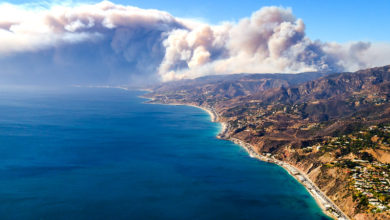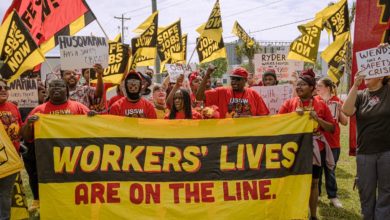During an Aug. 26 press
conference—nearly six years to the day after Hurricane Katrina and
decades of civic neglect brought devastation to New Orleans—New
York City Mayor Michael Bloomberg callously declared that there was
no evacuation plan for the nearly 12,000 people housed on Rikers
Island as Hurricane Irene headed toward New York City. The island
prison complex houses a diverse range of convicts, from adults to
children, including those with mental illness as well as people
awaiting trial.
Rikers Island was not included in any
of the three evacuation zones devised by the city. Fortunately,
Hurricane Irene had less of an impact than anticipated. In August
2005 in the Orleans Parish Prison in New Orleans, prisoners were not
as fortunate.
When Hurricane Katrina hit, the guards
abandoned thousands of prisoners—even after Mayor Ray Nagin issued
an evacuation order. The water rose in parts of the prison while
prisoners were still locked in their cells.
The facility also housed incarcerated
children as young as 10. Thirteen-year-old Ashley George was forced
to relieve herself in front of adult male prisoners while
sewage-tainted floodwater rose around her before she was rescued by
other prisoners.
Inmates reported that at one point the
water was up to their chests—with no way to get out. Other
prisoners mobilized and assisted those in lower cells—it took hours
of kicking to break the hinges off of the cell doors. Inmates had no
food and water for four days. Those who needed medical attention
received no care. Prisoners who were able to get out of the prisons
were met by deputies in boats who took them to a nearby bridge, but
no attempt was made to rescue those trapped inside.
The prisoners on the bridge were left
for over two days. Inmates reported having to urinate on themselves
as there were no bathroom facilities and they were not permitted to
stand. In the end, more than 500 prisoners were unaccounted for and
many are believed to have died in the flooding.
After what happened at OPP in 2005, it
is hard to believe that another municipality could anticipate a
hurricane without having an evacuation plan for prisoners. But to
assume that the bosses who run New York would heed the lessons from
the unnecessary torment of the OPP prisoners would be to
misunderstand the role of prisons and courts in capitalist society
specifically, and the role of the state more generally.
What happened in the OPP during
Hurricane Katrina and this year’s fiasco in New York City illustrates
what is wrong with the prison system as a whole. It is not just in
disaster preparedness that prisons fail. The whole criminal justice
system—from the beat cops who make arrests to the judges who pass
sentences and the prison guards who carry them out—operates on one
motivating force: the preservation and protection of capitalist power
and property. Thus those in charge of the inmates conclude that these
men, women and children are simply not worth the effort to save in
the event of a natural disaster.
As the gap between rich and poor
increases, as unemployment and underemployment become more common,
especially among young people, as education and medical costs, credit
and mortgage debt and the rising cost of food and fuel drag more
people down from a “middle class” standard of living, the more
conditions exist for rapid social change and for revolutionary ideas
to spread. Prisons exist to absorb those most likely to develop a
revolutionary mindset or upset the social order. Let us take note
that as violent crime has been decreasing across the board in recent
years, the prison population has exploded thanks to mandatory
sentencing and three-strike laws.
Prisons are institutions of class
domination and oppression, not neutral tools of social order. They
exist to mediate the conflict between rich and poor, essentially
housings the POWs of the class war. The contempt the capitalist state
has for those their system incarcerates cannot be made clearer than
in the examples of New Orleans and New York City. The Party for
Socialism and Liberation stands for tearing down every prison wall
and creating a new system of workers’ justice focusing on
rehabilitating those who have committed offenses against socialist
social norm.






